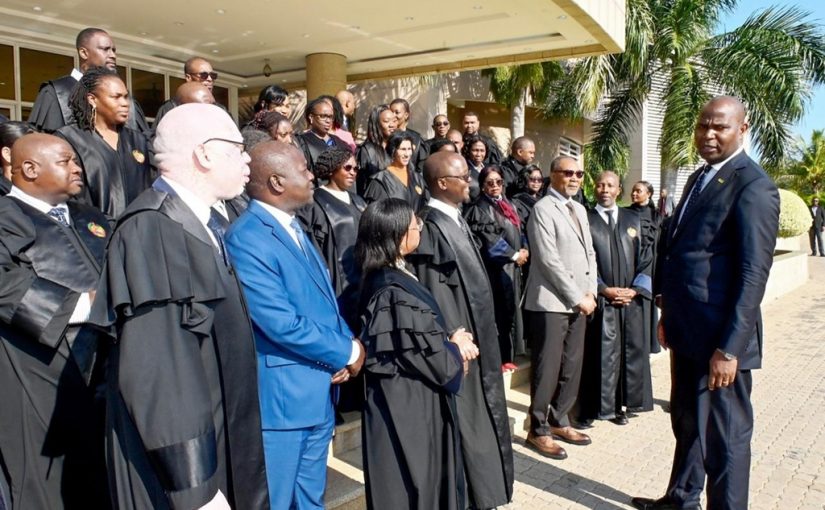Mozambique and Eswatini to invest €40 million in water storage dam
Mozambican judges push for salary reform

Photo: Presidency
Mozambican judges yesterday asked the President of the Republic to introduce improvements to the living and working conditions of magistrates, stating that this is one of the prerequisites for combating illegality in the class and in society.
“We need to correct, as soon as possible, the problems with the Single Salary Table (TSU), which have fundamentally resulted in the strangling of the career of the judiciary, making the [career] ladder nonsensical,” said the president of the Mozambican Association of Judges (AMJ), Esmeraldo Matavale, when the judiciary met the President of the Republic in Maputo, in anticipation of Judges’ Day, which is celebrated on May 8.
The judges told the Mozambican president, Daniel Chapo, that salary issue of the class should be analysed taking into account the risks of the profession, pointing out that only improving working conditions would help combat illegality among judges and in society.
Decent conditions
“Judicial independence is not a corporate privilege, but rather a guarantee for citizens, especially the most vulnerable, that their rights will be judged by impartial judges, free from internal or external pressure and, above all, committed to the Constitution and the law,” Matavale said.
The magistrate demanded a “short-term response” to the security problem, also calling for solutions to housing problems, in which he suggested that the state pay rent to provide dignity to magistrates, access to medical treatment for judges, and decent transport, with the payment of car allowances.
“If the judge feels insecure, is threatened, shot, attacked, kidnapped and robbed almost every day, it is clear that he will not have the serenity and tranquillity necessary to deal with similar problems brought to the courts by fellow citizens,” said the president of AMJ.
“When a judge has to take public transport, known as a ‘chapa’, with the users of his court or ask the defendant for a lift to go to work or to another place, the dignity and prestige of the position are jeopardized, in addition to the risk to the safety of this judge and the danger to impartiality and independence when he has to make a decision,” he concluded.
Reform promises
The President of Mozambique promised reform of the justice system, with the aim of strengthening the sector in the fight against various types of crime.
“We want to reiterate our commitment to strengthening the justice system. We also reaffirm our priority in resolving all the concerns that the class has raised and with all legal and institutional instruments,” President Chapo responded, promising to consolidate an “integral and fair” justice system.
In August 2024, the AMJ announced the indefinite suspension of a previous strike, as a result of the government’s openness to dialogue and its willingness to have the financial independence of the judicial system approved in parliament.
Mozambican judges complain about an alleged “depreciation of their status” and flaws in the implementation of the new Single Salary Table (TSU), which has been the target of strong opposition from other professional classes, such as doctors and teachers, who have even called strikes in protest against salary delays and cuts.
Approved in 2022 to eliminate asymmetries and keep the state’s wage bill under control, the TSU initially caused salaries to soar by around 36%, from an expenditure of 11.6 billion meticais per month (€169 million) to 15.8 billion meticais (€231 million).
The TSU ultimately cost around 28.5 billion meticais (€410 million), “more than expected”, according to a document from the International Monetary Fund (IMF) on the evaluation of the assistance program for Mozambique released in January.












Leave a Reply
Be the First to Comment!
You must be logged in to post a comment.
You must be logged in to post a comment.